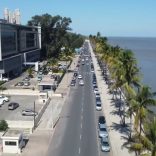Mozambique: Fisheries monitoring project launched - AIM
Banco de Moçambique may be subject to civil liability in Nosso Banco case

DW (File photo) / Central Bank's new building under construction in Maputo
Mozambican lawyer Gilberto Correia says the central bank bears some responsibility for the collapse of O Nosso Banco and may have been negligent in fulfilling its duties.
Most of the money invested in O Nosso Banco is thought to belong to Mozambican workers, given that 77 percent of the shares were held by the National Institute of Social Security (INSS), which is custodian of the Mozambican workers’ retirement pension fund.
According to Labour Minister Vitoria Diogo, in addition to its initial investment, INSS recapitalised O Nosso Banco twice, but never received any dividends, and was also a depositor in the institution, a scenario that raises doubts about the responsible application of the public’s money.
According to lawyer Télio Chamuço, “the INSS is endowed with legal personality and has administrative, financial and patrimonial autonomy, which means that it can invest”. But, he warns, “You can make investments using your means, and now, with respect to the values in your custody, belonging to the workers, because they are not yours, you can not use them to make investments. their.”

Who watches over the interests of the workers?
The question that arises is whether there is a legal and transparent accountability in the country concerning investment involving worker’s money. Gilberto Correia, also a lawyer, says first of all that “the INSS has long been considered a ‘slush fund’ [saco azul] for not very clear business”.
Correia points out that “regardless of whether there is regulation or not, when you are managing pension money that people are paying in today to receive 20 or 30 years from now, there must be all possible prudence. Whoever contributes to the fund today benefits later”.
And Correia points the accusatory finger. “It is clear that there is no good management and thart no-one in Mozambique except the INSS administrators thinks that the INSS has applied the funds well. There have been many problems and scandals related to the use of these funds. The problem is that in Mozambique these deals are uncontrolled and are too linked to political power. Even though there is formal control, in practice there is none. “

Grey areas
O Nosso Banco customers were outraged by the central bank’s decision to close the institution. Under the deposit guarantee fund activated by the central bank [Banco de Moçambique], customers will receive 20,000 meticians (about EUR 250.00) in the first compensation phase, even if they have deposited 100,000 meticais. Who will return the money to customers, when and how is not clear.
Télio Chamuço says that a liquidation commission was created to manage the payment of creditors. Reserves may however be insufficient to cover customer values.
And according to Chamuço, O Nosso Banco’s accountability can be outlined as follows. “If there are irregularities committed in management or negligence or even intentional misdemeanours in the rational management of the assets of this bank, the managers are held accountable.”

Sue the Central Bank?
But for Correia, accountability is not O Nosso Banco’s alone. “It is suing the Banco de Moçambique [central bank] and O Nosso Banco,” he says.
He believes that if “the Bank of Mozambique uses the deposit guarantee fund to pay 20,000 meticais to each O Nosso Banco customer, as the administrator [Joana Matsombe] said, it means that [O Nosso Banco] does not have sufficient assets to be liable for its obligations. It means that it was already in a chaotic state of affairs when it was closed.”
The lawyer points out that “in Mozambique there is a regulatory body that must defend not only public interests, but must defend the depositors first. What transpires here is that this supervisory body, because of problems related to non-technical interests, did not comply with its supervisory duties to the point of making a preventive intervention in the [Nosso Banco] bank”.
Finally, Correia stresses, “it is possible to file a civil liability lawsuit against O Nosso Banco and the Banco de Moçambique bank and also to hold the central bank responsible for negligence and noncompliance of its duties of supervision and preventive action.”
Public company EDM, with 15 percent, and SPI – Gestão de Investimentos, a company linked to the ruling party elite, are also O Nosso Banco shareholders.













Leave a Reply
Be the First to Comment!
You must be logged in to post a comment.
You must be logged in to post a comment.